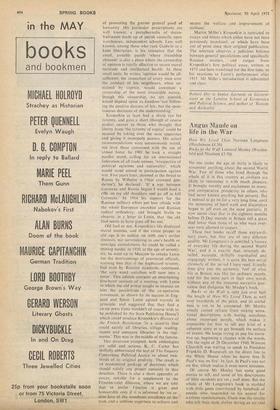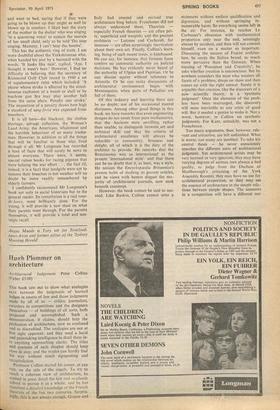Angus Maude on life in the War
How We Lived Then Norman Longmate (Hutchinson £4.50)
No one under the age of thirty is likely to remember anything about the second World War. Few of those who lived through the whole of it in this country as civilians are likely to remember it with much pleasure. It brought novelty and excitement to many, and comparative prosperity to others who had never known anything but poverty. But it seemed to go on for a very long time, until the monotony of hard work and discomfort began to tell even on the most patriotic. It now seems clear that in the eighteen months before D-Day morale in Britain fell a great deal lower than those of us who were over- seas were allowed to suspect.
These two books recall those extraordi- nary years, but they are of very different quality. Mr Longmate's is subtitled 'a history of everyday life during the second World War', and it is exactly that; minutely de- tailed, accurate, skilfully marshalled and engagingly written, it is quite the best social chronicle of the period I have read. It really does give you the authentic 'feel' of what life in Britain was like for ordinary people, told for the most part in their own words without any of the tiresome narrative jour- nalese that disfigures Mr Mosley's book.
Backs to the Wall is only just over half the length of How We Lived Then, at well over two-thirds of the price, and its useful- nes's is not to be compared. Mr Mosley simply cannot refrain from mixing sensa- tional descriptions with boring anecdotes about important people, which makes it impossible for him to tell any kind of a coherent story or to get beneath the surface of events. He keeps trying to pep his narra- tive up, beginning a chapter with the words, 'On the night of 29 December 1940. Winston Churchill was waiting to speak to President Franklin D. Roosevelt on the direct line to the White House when he learnt that St Paul's was on fire'. in fact, St Paul's was not on fire, which makes it even more tiresome.
Of, course Mr Mosley has some good stories to tell, and some of his descriptions of blitz incidents are vet, well done. But the whole of Mr Longmate's hook is studded with little gems contributed by hundreds of people who. responded to his appeal for wartime reminiscences. There was the couple who left their dank shelter during an air-raid and went to bed, saying that if they were going to be blown up they might as well be blown up in comfort. I liked best the story of the mother in the shelter who was singing 'in a quavering voice' to sustain the morale of her small child, only to be told `Do stop singing, Mummy, I can't hear the bombs'.
This has the authentic ring of truth. I am more doubtful about the Yorkshireman who, when handed his pint by a barmaid with the words, 'It looks like rain', replied, 'Aye, I thought it wasn't beer' However, I find no difficulty in believing that the secretary of Richmond Golf Club issued in 1940 a set of supplementary rules which included: 'A player whose stroke is affected by the simul- taneous explosion of a bomb or shell or by machine gun fire may play another ball from the same place. Penalty one stroke.' The imposition of a penalty shows how high a standard of sang-froid was expected from members.
It is all here—the blackout, the clothes shortage, salvage collection, the Women's Land Army, the Americans, whalemeat and the horrible behaviour of so many trades- men. However, in addition to all the things that will be familiar to those who lived through it all, Mr Longmate has recorded a host of facts that will surely be news to almost everyone. There were, it seems, special ration books for racing pigeons that were helping the war effort . . . the fact (if, indeed, it is a fact) that landgirls were apt to remove their breeches in hot weather will no dotibt be more readily remembered by elderly farmers.
I confidently recommend Mr Longmate's book not only to social historians but to the general reader. Its compilation is a real tour- de-force, most brilliantly done. For the Young, it will provide a new slant on what their parents went through. For the parents themselves, It will provide a total and nos- talgic recall.
Angus Maude is Tory MP for Stratford- upon-Avon and former editor of the 'Sydney Morning Herald'











































 Previous page
Previous page